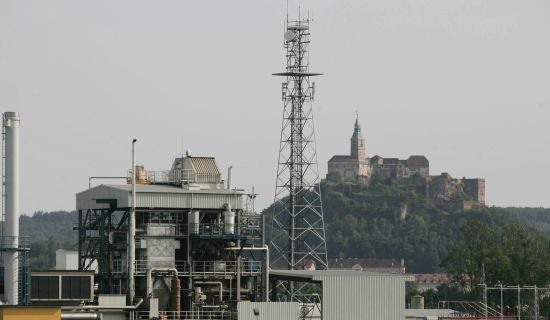
Plant 1 in the east Austrian town of Gussing, where green technology is
drawing visitors.
'Dead-end' Austrian town blossoms with green energy
GÜSSING, Austria: For decades, the Austrian town of Güssing was a forgotten outpost not far from the rusting barbed-wire border of the Iron Curtain.
Now it's at the edge of a greener frontier: alternative energy. Güssing is the first community in the European Union to cut carbon emissions by more than 90 percent, helping it attract a steady stream of scientists, politicians and eco-tourists.
"This was a dead-end town and now we're the center of attention," said Maria Hofer, a lifelong resident, as she bought organic vegetables at a farmer's market. "It seems like every week we read about new jobs from renewable energy."
Güssing's transformation started 15 years ago when, struggling to pay its electricity bill, the town ordered that all public buildings would stop using fossil fuels. Since then, Güssing has fostered a whole renewable energy industry, with 50 companies creating more than 1,000 jobs and producing heat, power and fuels from the sun, sawdust, corn and cooking oil.
Signs reading "Eco-Energy Land" greet people entering the town, located 130 kilometers, or 80 miles, southeast of Vienna. Visitors are as diverse as Scottish farmers, Japanese investors and a delegation from the Organization for Security and Cooperation in Europe.
"The town is combining growth in tourism revenue with being in the vanguard of environmental sustainability," said Bernard Snoy, who, as economic director at the Vienna-based OSCE, brought a group of 50 diplomats from 30 countries to Güssing in June.
Güssing used to rely on agriculture, with farmers selling their corn, sunflower oil and timber. As for tourism, the main attraction was a 12th-century castle built by Hungarian nobles.
The town could hardly afford its €6 million, or $8.1 million, fuel bill when Peter Vadasz was first elected mayor in 1992. The turnaround started after he hired Rheinhard Koch, an electrical engineer and Güssing native, to assess how the town of 4,000 people could benefit from its natural resources.
Today, Güssing generates 22 megawatt hours of power a year, including an 8 megawatt surplus that is sold to the national grid, said Koch, who now runs the European Center for Renewable Energy, based in the town and funded by Güssing, the EU and the Austrian government. Sales of excess power generate about €4.7 million in annual revenue and a €500,000 profit that is plowed back into alternative energy projects.
"Just to turn to renewable energy brought advantages we didn't dream of before," said Vadasz, a former schoolteacher. "A lot of money that left before, now stays in the region."
Güssing began building its energy network in 1992 with a wood-burning plant that provided heat for 27 homes. The second step was a facility that made car fuel from rapeseed. By 1996, Güssing had started to generate electricity and expanded its heating system to the whole town.
The breakthrough came in 1998, when Koch and Vadasz saw a presentation by a Viennese scientist, Hermann Hofbauer, about a technology he had developed to make an alternative fuel from wood.
They asked Hofbauer and Vienna's Technical University to build a pilot project. A local company later licensed the technology, which uses steam to separate carbon and hydrogen from scrap lumber, then recombines the molecules to make a form of natural gas. The gas in turn fuels the city's power plant.
Güssing has reduced carbon dioxide emissions by 93 percent from 1995 levels, according to the renewable energy center. Vaxjo, the Swedish town that won the EU's "Sustainable Community" award this year, has cut emissions by 25 percent during the past decade.
Former Vice President Al Gore last month called for 90 percent cuts worldwide by 2050.
The European Environment Agency, which tracks renewable energy projects in the 27-member EU, doesn't know of any other town that has achieved similar reductions in carbon emissions, said Brendan Killeen, a spokesman for the agency, which is based in Copenhagen.
Still, Güssing must protect the surrounding forest land to maintain its supply of renewable energy, said Raphael Rindler, a Franciscan priest who has preached in the town for four years.
"People here take the forests for granted, the way people thought about oil 50 years ago," he said.
Rindler said he was more hopeful about the solar power that is scheduled to start being produced in Güssing next year when Solon AG Fuer Solartechnik of Germany finishes a €50 million plant.
Meanwhile, Güssing is preparing for more tourism, building new sidewalks and widening the road to include parking spaces.
Copyright © 2007 the International Herald Tribune All
rights reserved
![]()